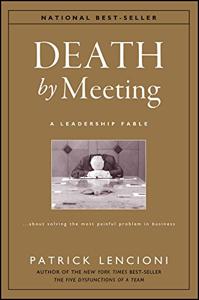
Want to learn the ideas in Death By Meeting better than ever? Read the world’s #1 book summary of Death By Meeting by Patrick Lencioni here.
Read a brief 1-Page Summary or watch video summaries curated by our expert team. Note: this book guide is not affiliated with or endorsed by the publisher or author, and we always encourage you to purchase and read the full book.
Video Summaries of Death By Meeting
We’ve scoured the Internet for the very best videos on Death By Meeting, from high-quality videos summaries to interviews or commentary by Patrick Lencioni.
1-Page Summary of Death By Meeting
The Story: Casey
Casey MacDaniel is the founder and CEO of Yip Software. He’s a nice guy, but he’s not very inspiring as a leader. In fact, he’s boring. He lives in Mount Carmel, California where his family has lived for 50 years. When he was young, Casey worked as a caddy on the local golf course to earn money for college. His father won him an engineering scholarship to the University of Arizona where he studied computers and electrical engineering. Casey wasn’t really interested in school though so after graduating from college with a degree in computer science and some mediocre grades, he joined the PGA tour (Professional Golfers Association). Although Casey had potential as a golfer because of his excellent skills during high school, once on tour it became evident that something was wrong—he developed what golfers call “the yips,” which makes it difficult to putt or aim shots accurately when playing golf games professionally; this forced him out of contention for tournaments so instead Casey invented virtual golf software called “Golf Pro: The Virtual Professional.” This company grew rapidly over time and eventually merged into Yip Software which sold sports games online through various websites such as Amazon Online Games Store.
Meanwhile, Casey and his wife Patricia had four children. Because of their large family, Casey refused to produce violent games that kids love. Instead he insisted on realism, innovation and high quality sports games for adults and teens who thought of themselves as athletes.
Yip was a successful company, but it could have been more successful. A more dynamic leader would have made better use of the opportunity and grown the business faster. The company didn’t grow as much as it could have because Casey wasn’t that driven to succeed. He just wanted to make a little profit and play golf on weekends.
Meanwhile, Yip’s employees went to other companies’ conferences and came back with a newfound passion for business. They felt like indentured serfs who were watching knights ride off to a tourney in some medieval fantasy. Such enthusiasm was far from the corporate culture at Yip’s company.
One day, Casey took a step that was different from what he usually did. He hired someone to help with human resources at Yip. The person who helped him was named Michelle and she came to the meeting equipped with data about morale at Yip. That sort of thing hardly ever happened in this company because people were used to just making decisions on their own. But when they saw all the data presented by Michelle, everyone wondered why there was so much low morale in the company. Sophia suggested that perhaps they should make some violent kids’ games since sales had been poor lately (sales is her responsibility). Tim Carter, who is responsible for finances, said maybe raises or bonuses would be a good idea since no one seemed happy anymore (he has also seen poor numbers lately). Connor made a comment that kept Casey up at night: he said he liked his job but didn’t seem interested in getting more money or doing something else; instead he wanted to stay put where he was comfortable and not take any risks.
Casey was upset when he found out that his company would be sold. He had always been fair to his employees, so he decided to give them a share of the profits by having an initial public offering (IPO). Then J.T., from Playsoft, called and said they were interested in buying Yip. Casey agreed on one condition: Playsoft must let him run Yip as its own entity with autonomy over operations and management.
Playsoft agreed to the conditions and Casey closed the deal. However, Playsoft paid in stock instead of cash, so when Playsoft’s stock plunged shortly after the sale, Casey was stuck with a lot of worthless shares.






